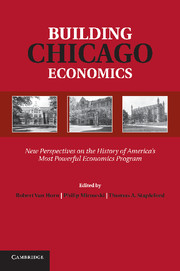 Building Chicago Economics
Building Chicago Economics A Tale of Two Transitions
from Part Three - Imperial Chicago
Published online by Cambridge University Press: 05 November 2011
It is common practice to equate “law and economics” with the Chicago School and Chicago law and economics with Richard Posner and the economic analysis of law. Just as common is the tendency to equate Chicago microeconomics, or price theory, with Gary Becker, George Stigler, and the hard-nosed rational choice approach that has extended the economic paradigm across the social spectrum. In fact, however, these are distinctly modern variants of what are lengthy Chicago traditions in law and economics and price theory. The Chicago price theory tradition is now more than three quarters of a century old, and the law and economics tradition is only a couple of decades younger than that. However, Chicago price theory prior to, say, the 1960s was a rather different enterprise than that of the subsequent period. Likewise, law and economics at Chicago has undergone a major transformation during the same period, as pointed out by, for example, Alain Marciano (2008) and Steven Medema (, ). To date, however, there has not been a historical explanation given for this transformation in law and economics. The position taken here is that the transformations of price theory and law and economics are linked – specifically, that the transformation of Chicago law and economics evolved out of the transformation in price theory.
The first generation of Chicago law and economics – as reflected in the teaching and scholarship of Aaron Director, Director’s students, and Ronald Coase – has its foundations in the first generation of the Chicago price theory tradition, that is, in the approach to the subject found in the price theory courses and scholarship of Frank Knight, Jacob Viner, and, later, Milton Friedman. The second generation of Chicago law and economics – the economic analysis of law – is grounded in the rational choice theory, a form of price theory quite different from the “old” Chicago version, in spite of elements of common lineage, as well as a very different conception of “economics,” one that involved a (then) distinctive take on Lionel Robbins’s definition of the subject as “the science which studies human behaviour as a relationship between ends and scarce means which have alternative uses” (1932, 15).
To save this book to your Kindle, first ensure [email protected] is added to your Approved Personal Document E-mail List under your Personal Document Settings on the Manage Your Content and Devices page of your Amazon account. Then enter the ‘name’ part of your Kindle email address below. Find out more about saving to your Kindle.
Note you can select to save to either the @free.kindle.com or @kindle.com variations. ‘@free.kindle.com’ emails are free but can only be saved to your device when it is connected to wi-fi. ‘@kindle.com’ emails can be delivered even when you are not connected to wi-fi, but note that service fees apply.
Find out more about the Kindle Personal Document Service.
To save content items to your account, please confirm that you agree to abide by our usage policies. If this is the first time you use this feature, you will be asked to authorise Cambridge Core to connect with your account. Find out more about saving content to Dropbox.
To save content items to your account, please confirm that you agree to abide by our usage policies. If this is the first time you use this feature, you will be asked to authorise Cambridge Core to connect with your account. Find out more about saving content to Google Drive.